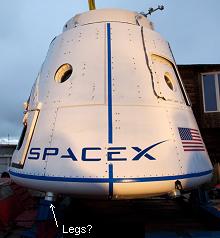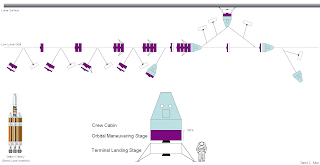Thoughts on a SpaceX Lunar Architecture

It's no secret that the SpaceX Dragon capsule has a very impressive heat shield believed to be capable of direct lunar return. Official statements from SpaceX that they intend to add deployable landing gear and leverage the thrusters in order to land on land in the future prompts an obvious suggestion: if it can land on Earth, could it land on the Moon too? The Dragon capsule has thus far been launched on the Falcon 9 booster, and although that booster is able to put 2473kg into lunar transfer orbit, after using the Draco thusters on the Dragon to enter low lunar orbit the total mass would be under 1876kg.. this seems a bit light for a crewed configuration, especially when you consider that only 1422kg of it could be returned to Earth. And that's just lunar orbit. We need a bigger rocket, and the official SpaceX plan right now is called the Falcon 9 Heavy. One should not be confused by the name, the F9H is not "heavy lift" in the sense often used by space ad
